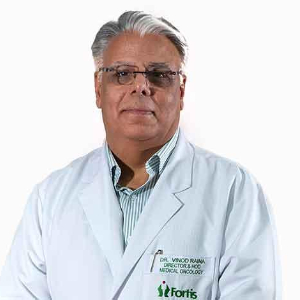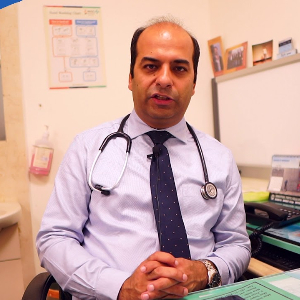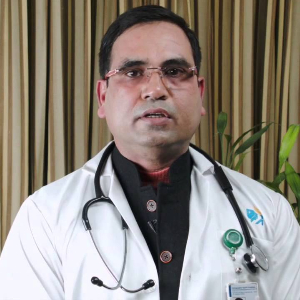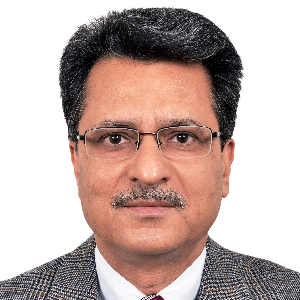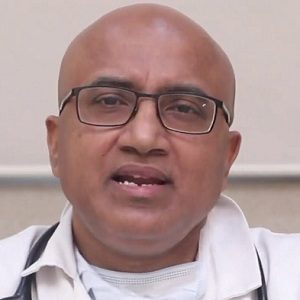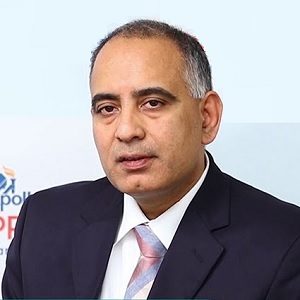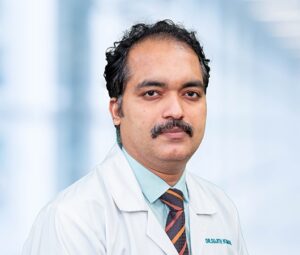Best Doctors in India for Malignant Mesothelioma Treatment
- Medical Oncologist, Gurugram, India
- Over 40 years’ experience
- Fortis Memorial Research Institute
Profile Highlights:
- Dr. Vinod Raina is a distinguished figure in the field of Medical Oncology in India, with over 40 years of exemplary experience. He is currently associated with Fortis Memorial Research Institute in Gurugram where he is functioning as the Director and Head of Medical Oncology and Hematology.
- His primary expertise lies in Chemo treatment and is the first to perform high-dose chemo in India. He also performed the first peripheral blood BMT in India.
- Additionally, Dr. Raina possesses specialized expertise in treating a wide spectrum of cancers including Breast Cancer, Lung Cancer, Gastrointestinal Cancer, Urological Cancer, Gynecological Cancer, Lymphoma, and Myeloma. His contributions extend to performing approximately 400 BMTs, enhancing treatment options for various cancers.
- Medical Oncologist, Gurugram, India
- 15+ years’ experience
- Fortis Memorial Research Institute
Profile Highlights:
- Dr. Ankur Bahl is a distinguished Senior Director of Medical Oncology at Fortis Memorial Research Institute (FMRI), Gurugram, with over 15 years of extensive experience in the field of oncology.
- Dr. Bahl completed his MBBS and MD in Medicine from Maulana Azad Medical College, Delhi. He further specialized by earning a DM in Medical Oncology from the prestigious All India Institute of Medical Sciences (AIIMS), New Delhi.
- His clinical expertise encompasses a broad range of oncology treatments, including immunotherapy, targeted therapies combined with chemotherapy, hormonal therapy, as well as supportive and palliative care.
- Top Medical Oncologist | Apollo Hospital, New Delhi, India
- 20+ Years Experience
- Indraprastha Apollo Hospital, New Delhi
Profile Highlights:
- Dr. Manish Singhal is a highly experienced medical oncologist based in South Delhi, with a distinguished career spanning over 20 years. Currently, he is practicing as a Consultant in Medical Oncology at Apollo Hospital, New Delhi.
- Dr. Singhal is widely recognized as one of the top medical oncologists in the region, celebrated for his expertise in delivering personalized treatment plans tailored to each patient’s unique needs.
- Specializing in the diagnosis and treatment of various cancers, including breast, lung, oral, melanoma, and osteosarcoma, Dr. Singhal offers comprehensive care that includes advanced treatments like BMT, hormone treatment for prostate cancer, and chemotreatment for hematological malignancies.
- He employs state-of-the-art diagnostic techniques to ensure precise diagnoses, enabling him to craft individualized treatment strategies that optimize efficacy while minimizing side effects.
- Top Medical Oncologist | Apollo Hospital, New Delhi, India
- 20+ Years Experience
- Indraprastha Apollo Hospital, New Delhi
Profile Highlights:
- Dr. P.K. Das is a highly esteemed medical oncologist in Delhi, renowned for his extensive experience spanning over 20 years.
- His practice is dedicated to providing comprehensive and compassionate care to patients grappling with various types and stages of cancer.
- Specializing in medical oncology, Dr. Das possesses profound expertise in diagnosing and treating cancers affecting diverse organs including breast, lung, colon, prostate, pancreas, liver, and kidney.
- Medical Oncologist: Artemis Hospital
- Over 10 Years' Experience
- Artemis Hospital, Gurgaon
Profile Highlights:
- Dr. Priya Tiwari is a distinguished Medical Oncologist based at Artemis Hospitals in Gurugram, renowned for her expertise in comprehensive cancer care.
- She has 10 years of experience.
- Her medical education includes an MD in Medicine and a DM in Medical Oncology from AIIMS, alongside an MBBS degree from IMS, BHU, where she was a gold medalist.
- Medical Oncologist, Gurugram, India
- Over 30 years’ experience
- Medanta-The Medicity, Gurgaon
Profile Highlights:
- Dr. Ashok Kumar Vaid is a reputed Medical Oncologist in India with expertise in the treatment of blood, lung, skin, breast, and gastrointestinal cancers.
- He is famously known for performing among the first 25 BMTs in a private hospital in India.
- Dr. Vaid’s primary area of focus lies in Leukemia, Lymphoma, Solid tumors, and the treatment of organ-specific benign and malignant tumors.
- He prefers to treat his patients using non-surgical and pain-free techniques that include Hormone Medicine, Biological Treatment, Targeted Treatment, and Chemo Treatment.
- Top Medical Oncologist | Apollo Hospital, New Delhi, India
- 15+ Years Experience
- Indraprastha Apollo Hospital, New Delhi
Profile Highlights:
- Dr. Dipanjan Panda is one of the well-known medical oncologists in India, having 15 years of expertise in treating bone and soft tissue cancers and gastrointestinal cancers.
- He is credited with starting the country’s first anticancer departments and PDCC program. Dr. Panda developed a medical oncology unit at Indraprastha Apollo Hospital in New Delhi, in association with the Institute of Liver and Biliary Sciences. He is currently working at Indraprastha Apollo Hospital in New Delhi as a Senior Consultant, Medical Oncology.
- Dr. Panda has written twenty peer-reviewed papers in national and international journals. He has presented numerous talks at global forums.
- Medical Oncologist, Chennai, India
- Over 28 years’ experience
- Apollo Cancer Centre Chennai
Profile Highlights:
- Dr. Sankar Srinivasan is one of the top Medical Oncologists in India with proficiency in cancer management for about 28 years.
- He got certified in Internal Medicine, Medical Oncology, and Hematology from American Board to enhance his skills.
- Dr. Srinivasan is placed in the best 10% of the Hematologists boards.
- He is an active member of several International Medical Association Boards.
- Medical Oncologist and BMT Specialist, Chennai, India
- Over 25 years’ experience
- Apollo Cancer Centre Chennai
Profile Highlights:
- Dr. Raja T is a renowned Medical Oncologist from Tamil Nadu who is currently serving as the Director of Medical Oncology at Apollo Cancer Centre in Chennai.
- He is well proficient in conducting a number of cancer procedures such as Cancer Screening, Chemo Treatment, PICC Line Insertion, BMT, Pap collection, lymphoma, Renal Cell Cancer management, and Head and Neck Tumor.
- Along with his clinical practice, Dr. Raja T is also a renowned veteran who has been the Principal Investigator for several clinical studies, a published author for journals, and a teacher.
- Medical Oncologist, Chennai, India
- Over 12 Years Experience
- Apollo Proton Cancer Centre
Profile Highlights:
- Based in Chennai, Dr. Sujith Kumar Mullapally is a skilled Medical Oncologist who is currently practicing as a Consultant Medical Oncologist at the Apollo Proton Cancer Centre, Chennai.
- Dr. Mullapally is quite versatile as he specializes in a range of oncology specialties. Thoracic Oncology, Neuro-Oncology, Head & Neck Oncology, Genitourinary Oncology and Bone & Soft Tissue Tumors are just a few of his expertise. In addition, he has a great deal of interest in Immuno-Oncology and Preventive Oncology.
- To detect various cancer forms early on, Dr. Mullapally uses cutting edge diagnostic methods including biopsies and imaging tests (X-rays, CT scans).
- As a specialist, Dr. Mullapally is aware of the difficulties in identifying and managing cancer. So as soon as a patient notices symptoms or has worries about their health, he advises them to consult a specialist who can offer more focused treatment.
- Following a diagnosis, Dr. Mullapally develops individualized treatment plans for patients that might involve immuno treatment, chemo treatment, radiation treatment, or surgery. These treatments are intended to minimize adverse effects while optimizing efficacy, and they are customized to meet the specific needs of every patient.
Best Hospitals in India for Malignant Mesothelioma Treatment
- City: Gurugram, India
Hospital Highlights:
- One of India’s best and largest multi-specialty hospitals, Medanta was built with the aim to bring India to the highest standards of medical care. The hospital has been providing the best medical services to its patients, since its inception, with care, commitment, and compassion.
- Equipped with 1250 beds, the hospital was founded by Dr. Naresh Trehan in the year 2009 with an aim to provide the best medical care at affordable costs. The hospital is spread across 43 acres and includes 45 operation theatres and 350 beds dedicated solely to ICU. The hospital includes over 800 doctors, and more than 22 specialty departments and has a dedicated floor for individual specialty in order to offer the best services under one roof.
- The hospital is considered one of the premier institutes in India for Cardiac Care and includes staffs and members of high caliber. The hospital has 6 distinct centers of excellence.
- City: Gurugram, India
Hospital Highlights:
- Artemis Hospital, established in 2007 in Gurugram, India, is a leading multi-specialty institution known for its excellence in patient care and advanced medical technology, offering comprehensive services across specialties like Cardiology, Oncology, Neurology, Orthopedics etc.
- Renowned for its patient-focused care, Artemis Hospital combines state-of-the-art infrastructure with a team of internationally trained doctors and surgeons, ensuring the highest standards of medical treatment.
- Accredited by JCI and NABH, Artemis Hospital meets global healthcare quality and safety standards, reflecting its commitment to providing compassionate, personalized care.
- The hospital is recognized for utilizing cutting-edge diagnostic and ther*peutic techniques, ensuring patients receive accurate diagnoses and effective treatments tailored to their needs.
- City: Chennai, India
Hospital Highlights:
- The Apollo Proton Cancer Centre in Chennai is the most sought-after private cancer hospital in India. It is an integrated facility that provides cutting-edge, all inclusive cancer treatment to patients all over the globe.
- The hospital is a part of the renowned Apollo Group which has a large network of over 74 hospitals in India and across the globe. Out of the 74 hospitals, 21 of them are cancer centres. However, Apollo Proton Cancer Centre is the only cancer hospital to have JCI accreditation.
- The Centre, which was established on the principles of excellence and expertise, unites a formidable medical staff led by some of the most illustrious figures in cancer treatment.
- The hospital follows the global ASTRO Model Policy. It is the same global policy which is followed by countries like USA, UK, and Europe.
- Apollo Proton Cancer Centre is among the very few hospitals in India to receive patients from First World countries such as USA, Canada, New Zealand, Australia, Singapore, Thailand, etc.
- Apart from that, it is also the first hospital in Chennai to receive patients from several countries like Uzbekistan, Kazakhstan, Turkmenistan, Georgia, Armenia, Azerbaijan, SAARC countries (Bangladesh, Nepal, Sri Lanka, Maldives, Bhutan, Afghanistan, and Pakistan), South Africa, Turkey, Egypt, etc.
- In fact, there is a dedicated team at the Apollo Proton Cancer Centre that serves only international patients. Thus, on a monthly basis, the Centre receives patients from across 32 countries.
- Moreover, there are certain treatments in Apollo Proton Cancer Centre that are not available in any other centre. APCC addresses all types of possible cancers that are usually not covered by any other centre.
- City: New Delhi, India
Hospital Highlights:
- Over the last 33 years, the Fortis Escorts Heart Institute has set new standards in cardiac treatment with groundbreaking research. It is now known around the world as a centre of expertise for Cardiac Bypass Surgery, Interventional Cardiology, Non-invasive Cardiology, Paediatric Cardiology, and Paediatric Cardiac Surgery.
- The hospital has cutting-edge laboratories that perform a wide range of diagnostic tests in Nuclear Medicine, Radiology, Biochemistry, Haematology, Transfusion Medicine, and Microbiology.
- Fortis Escorts Heart Institute boasts a diverse group of bright and experienced doctors who are backed up by a team of highly qualified, experienced, and devoted support professionals as well as cutting-edge equipment such as the recently installed Dual CT Scan.
- Approximately 200 cardiac doctors and 1600 personnel currently collaborate to manage over 14,500 admissions and 7,200 emergency situations each year. The hospital now has a 310-bed infrastructure, as well as five cath labs and a slew of other world-class amenities.
- City: Gurugram, India
Hospital Highlights:
- Fortis Memorial Research Institute (FMRI) is a premier multi-super-specialty, quaternary care hospital, known for its exceptional international faculty, top-tier clinicians, super-sub-specialists, and specialized nurses, all supported by cutting-edge technology.
- It is the flaship hospital of Fortis Healthcare Limited, part of IHH Healthcare Berhad, a leading integrated healthcare services provider in India. As one of the country’s largest healthcare organizations, Fortis operates 28 healthcare facilities with over 4,500 operational beds (including O&M facilities) and more than 400 diagnostic centers (including joint ventures).
- Recognized as one of the top hospitals in India, FMRI serves as a leading referral center and aspires to be the ‘Mecca of Healthcare’ for India and beyond. Its 11-acre campus is a testament to its commitment to providing world-class healthcare.
- Accredited by JCI and NABH, FMRI is dedicated to maintaining the highest standards of healthcare quality and safety, ensuring that every patient receives the best possible care. The hospital’s reputation is further enhanced by its state-of-the-art facilities and innovative medical practices.
- City: New Delhi, India
Hospital Highlights:
- The Indian Spinal Injuries Center (ISIC), provides state-of-the-art facilities for the management of all types of spinal ailments.
- Staffed with internationally trained, acclaimed, and dedicated spine surgeons, the hospital provides cutting-edge medical & surgical technology. The hospital provides comprehensive management of spinal injury, back pain, spinal deformities, tumors, osteoporosis, etc.
- The hospital performs motion-preserving spine surgeries including disc replacement and dynamic fixation, and minimally invasive spine surgeries such as endoscopic disc excision.
- The orthopedic service of the hospital covers all orthopedic ailments including trauma, joint diseases & replacements, oncology, pediatric orthopedics & upper limb ailment.
- City: Faridabad
Hospital Highlights:
In the sprawling city of Faridabad, where healthcare needs are diverse and ever-evolving, one institution has consistently stood out as a beacon of excellence in the field of medicine—Marengo Asia Hospital. Established with a vision to provide world-class healthcare services to the community it serves, Marengo Asia Hospital has emerged as a trusted name synonymous with quality, compassion, and innovation in healthcare.
- City: New Delhi, India
Hospital Highlights:
- Indraprastha Apollo Hospital is a 700-bedded multispecialty hospital in the heart of the capital of India. It is a part of Apollo Hospital group, one of India’s most reputed healthcare chains. Indraprastha Apollo Hospital has been accredited by Joint Commission International, making it the first internationally accredited hospital in the country in 2005.
- There are 52 specialties in the hospital with one of the best cardiology centers in the country. The hospital is also equipped with State of the art infrastructure facilities with the largest Sleep Lab in Asia and the largest number of ICU bed facilities in India.
- The latest and highly advanced technologies that are installed in the hospital include Da Vinci Robotic Surgery System, PET-MR, PET-CT, Cobalt-based HDR, Brain Lab Navigation System, Tilting MRI, Portable CT scanner, 3 Tesla MRI, 128 Slice CT scanner, DSA Lab, Endosonography, Hyperbaric Chamber and Fibro scan.
- City: New Delhi, India
Hospital Highlights:
- One of the well-regarded providers in India committed to the highest standards of clinical excellence and patient care, Max Super Specialty Hospital is a part of Max Healthcare, which is the second-largest healthcare chain in India. Regarded as one of the most well-regarded healthcare providers in the country, Max Super Specialty Hospital is committed to the highest standards of clinical excellence as well as patient care. The hospital is also equipped with the latest technology as well as cutting-edge research. The hospital is known to deliver and ensure the highest level of patient care.
- The hospital has more than 500 beds and offers treatment for over 35 specialties. The hospital also holds the credit of having installed the first Brain Suite in Asia. This is a highly advanced Neurosurgical machine that allows MRI to be taken while surgery is ongoing.
- Other advanced and latest technologies are also installed in the hospital such as the 1.5 Tesla MRI machine, 64 Slice CT Angiography, 4D ECHO, LINAC, and 3.5T MRI machine.
- City: Kolkata, India
Hospital Highlights:
- Founded in 2017, the HCG EKO Cancer Centre is a committed, all-inclusive cancer care facility in Kolkata.
- The hospital was collaboratively established by India’s leading cancer care provider HCG (HealthCare Global Enterprises Ltd.), and EKO Diagnostic Pvt. Ltd., a top diagnostic and imaging chain in Eastern India.
- With 88 beds, the hospital provides a full spectrum of services including diagnosis, prevention, screening, second opinions, treatment, rehabilitation, follow-up, and palliative care.
- Additionally, the hospital contains a day-care chemotherapy ward, Neutropenic ward, medical ICU, pharmacy, blood bank, and an IPD wing.
- At HCG EKO Cancer Centre Kolkata, a large team of cancer experts with experience in medical oncology, surgical oncology, radiation oncology, hemato oncology, BMT, and nuclear medicine collaborate to offer a variety of treatment options under one roof.
- Furthermore, the hospital is also known for employing the most advanced radiation technology such as, the Radixact, a next-generation TomoTherapy equipment that provides greater radiation delivery precision.
Mesothelioma
Mesothelioma is a type of aggressive and deadly cancer. It occurs in the thin layer of tissue that covers the majority of your internal organs, also termed as the mesothelium.
Although treatment options are available for this condition, for many patients suffering from Mesothelioma, a cure is not possible. The average life expectancy for a patient after diagnosis is 12-21 months, though prognosis might improve with treatment.
Symptoms
Signs and symptoms of this condition generally depend on where this cancer occurs-
Pleural Mesothelioma: This type of Mesothelioma affects the tissue surrounding the lungs, and can cause various signs and symptoms such as:
- Chest pain
- Shortness of breath
- Painful coughing
- Unexplained weight loss
- Lumps of tissue under your chest skin
Peritoneal Mesothelioma: This type of Mesothelioma occurs in tissue in the abdomen, and can lead to signs and symptoms such as:
- Abdominal pain
- Nausea
- Abdominal swelling
- Unexplained weight loss
Other forms:
Although other forms of Mesothelioma also exist, but signs and symptoms are generally unclear, since these forms of the disease are generally rare.
Causes & risk factors
The most common and main risk factor for mesothelioma is working with asbestos. Asbestos is a group of minerals containing thin microscopic fibers, which are resistant to heat, fire as well as chemicals, and do not conduct electricity. Due to this quality, they are generally used widely in the construction, automotive, and other industries.
In the manufacturing process for asbestos, the fibers are released into the air, and they might be inhaled and swallowed, which can lead to serious health problems. The majority of mesothelioma cases are linked with exposure to asbestos during work. There is also evidence to suggest that family members and anyone living with asbestos workers also have an increased risk of developing this condition. This risk is generally the result of the dust brought home on the clothing and hair.
In some cases, Mesothelioma has also been reported in individuals with no known exposure to asbestos. Some of the uncommon but possible causes include:
Zeolites- These types of minerals are related to asbestos chemically. Exposure to erionite, another one of these related minerals, is also believed to be responsible for high rates of mesothelioma rates in areas such as Turkey, where it is commonly found.
Radiation- According to The American Cancer Society, there have been a few published reports of Mesothelioma that developed after exposure to high doses of radiation to the abdomen or chest after injections of thorium dioxide or thorotrast. This material was used by doctors in chest X-rays in the 20th century.
Genetics- According to some experts, certain people are also genetically predisposed to mesothelioma. Rates of the disease can vary among populations.
SV40 virus- Some studies in laboratory animals have also raised the possibility that infection with the simian virus 40 can increase the risk of developing mesothelioma.
Diagnosis
Physical exam
Imaging scans
Your doctor will likely order imaging scans such as a chest X-ray and a computerized tomography scan of your abdomen or chest, in order to look for abnormalities.
Based on the findings, you might need to undergo further testing in order to determine whether mesothelioma or another disease is leading to the symptoms.
Biopsy
Additional tests
Once your mesothelioma has been confirmed, your doctor might need to recommend additional tests in order to understand whether cancer has spread to lymph nodes or to any other areas in your body.
Tests can include:
- CT scans of your chest and abdomen
- Positron emission tomography (PET)
- Magnetic resonance imaging (MRI)
Your doctor is going to determine which tests are appropriate for you. Then he/she is going to use the information from these tests to assign a stage to your cancer, which ranges from I to IV. The lower the number, the more it is likely to be localized to the area around the lungs, and the higher it is, the more likely it is that the cancer has spread to other areas of your body. Once your doctor is able to identify the cancer stage, he/she is going to select the treatments that are right for you.
Treatment
While deciding the treatment option for you, your doctor considers several factors such as your overall health, the stage, or your cancer as well as its location.
Unfortunately, this condition is generally aggressive, and for most people, a cure isn’t possible. It is also usually diagnosed at an advanced stage when removing the cancer is not possible, through an operation. Therefore, your doctor might work to control it.
Surgery
Chemotherapy
Chemotherapy involves using chemicals to kill cancer cells. Systemic chemotherapy is able to travel throughout the body and might help to shrink or slow the growth of a mesothelioma that is not removable through surgery. Chemotherapy can sometimes also be used before surgery to make the operation easier or in some cases, after surgery, for reducing the chance that cancer will return.
Chemotherapy drugs can also be heated and be directly administered into the abdominal cavity, in the case of peritoneal mesothelioma.
Radiation therapy
Radiation therapy focuses high-energy beams from sources such as protons or X-rays to a specific spot or spots on the body. Radiation can also be used after surgery for killing any remaining cancer cells. It might help in reducing symptoms of advanced cancer as well, in situations where surgery is not an option.
Immunotherapy
Targeted Therapy
Complications
As your pleural mesothelioma continues to spread in the chest, it can put pressure on the structures in that area, leading to complications such as difficulty in breathing and swallowing, chest pain, pain caused by pressure on the nerves and spinal cord, and accumulation of fluid in the chest, which can compress the lung nearby and make breathing even more difficult.
Prevention
In order to prevent this condition, it is important to reduce your exposure to asbestos. Workers who might encounter asbestos fibers include:
- Asbestos miners
- Plumbers
- Pipefitters
- Electricians
- Insulators
- Demolition workers
- Selected military personnel
- Shipyard workers
- Home remodelers
- Brake mechanics
If you are any of the above, then it is important to ask your employer, whether you have a risk of asbestos exposure on the job.
Remember to follow all safety precautions in your workplace, which includes wearing protective equipment. It is also best if you shower and change out of your work clothes before you are taking a lunch break or going home. You can talk to your doctor to ask if you need to take any further precautions.

